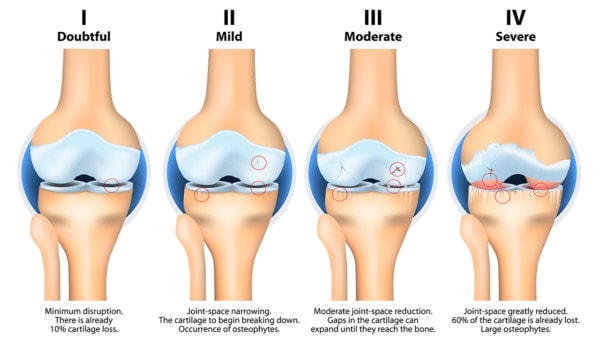Can Weightlifting Improve Knee Cartilage Health?
I get asked all the time by patients how best to improve knee cartilage health. There is no shortage of products, therapies, and exercises that claim to improve cartilage. Now a new study weighs in on an activity that most would think would beat up cartilage, may actually make it thicker.

Designua/Shutterstock
Cartilage is one of the shock absorbing structures of the knee. It covers the ends of the bones and provides cushioning and a surface that’s slick with little friction. Arthritis happens when the cartilage is damaged or lost. The most common knee surgery in the United States for knee arthritis (arthroscopic debridement) removes knee cartilage by “cleaning up” the knee. Studies now show that this is a bad idea and that this surgery likely leads to more and not less arthritis.
Can an activity like heavy weight lifting or running make cartilage thicker, or does it make it break down faster? This has been a question that has perplexed cartilage researchers for the last two decades. You can find studies that seem to show that moderate exercise helps or doesn’t hurt cartilage. You can also find research that shows that excessive exercise can make cartilage thinner. It’s into that confusing picture of cartilage thickness and activity that this study inserts yet another piece of the puzzle.
The researchers here looked at elite weightlifters and compared their cartilage thickness on sophisticated MRI measurements to physically inactive men. Thirteen weightlifters and 20 controls were matched for age and weight and had their cartilage thickness measured in many regions of the knee. The study concluded that the weightlifters did have significantly thicker knee cartilage in most regions measured.
The big issue with the study is what came first, the chicken or the egg? Meaning, do elite weight lifters grow thicker cartilage because of the physical demands of their sport or do people with cartilage problems due to injury or genetics never get to the point of being an elite weight lifter (i.e. they’re selected out early due to injuries). Regrettably this study isn’t designed to answer that question.
The upshot? What can you do if you want to improve your cartilage health? The gestalt that I have after reading many research studies in this area is that if you have healthy cartilage, moderate exercise will keep it healthy better than no exercise. If you have bad cartilage, then moderate exercise may or may not help. In that case, you may want to look at biologic options like stem cells or platelets. How about big loading and long distances? The data on this is less clear. Supplements may also be something to consider, as many objective MRI studies do show that for patients with cartilage, certain supplements help to maintain cartilage health.

NOTE: This blog post provides general information to help the reader better understand regenerative medicine, musculoskeletal health, and related subjects. All content provided in this blog, website, or any linked materials, including text, graphics, images, patient profiles, outcomes, and information, are not intended and should not be considered or used as a substitute for medical advice, diagnosis, or treatment. Please always consult with a professional and certified healthcare provider to discuss if a treatment is right for you.
